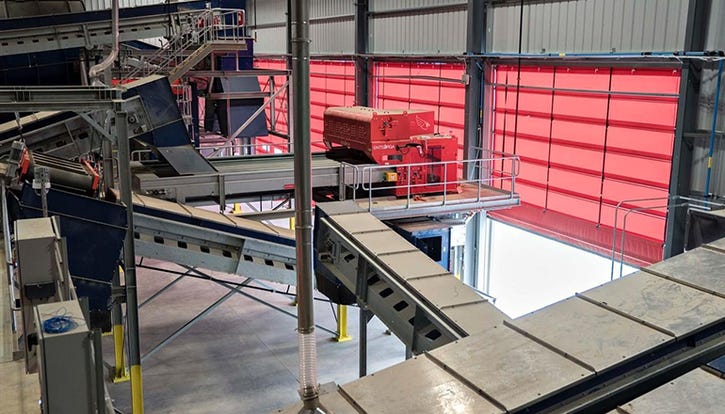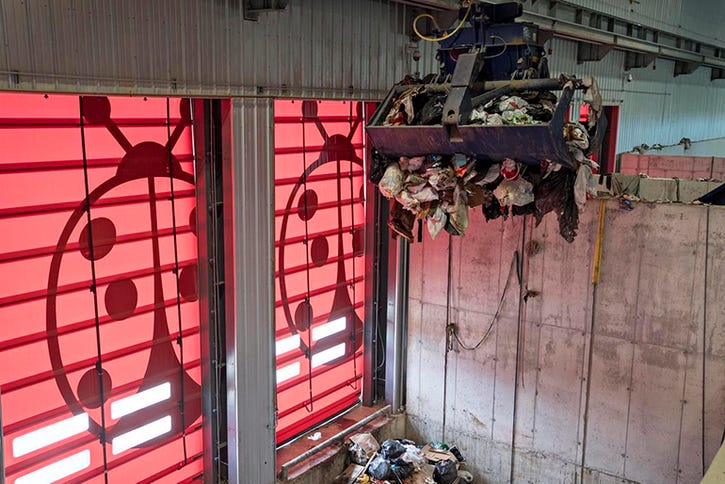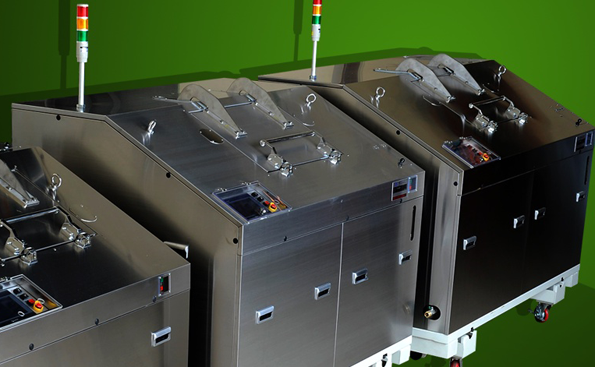Talking Tech with Waste360’s 2020 Innovator Award Recipient
Michael R. Schmidt of BioHiTech Global discusses his career, advancements in technology and how BioHiTech is working to reduce food waste and turn MSW into alternative fuel.

Technology is on the rise in the waste and recycling industry, and this year’s Waste360 Innovator Award recipient is part of a company that’s developing and using technology to reduce food waste as well as turn municipal solid waste (MSW) into a solid recovered fuel.
At BioHiTech Global, Michael R. Schmidt, vice president of global sales and marketing, is instrumental in the operations of Entsorga West Virginia, the nation’s first high-efficiency biological treatment (HEBioT) mechanical biological treatment (MBT) system that transforms MSW into alternative fuel for a nearby cement manufacturer. In addition, he helps BioHiTech’s customers measure, manage and divert food waste via BioHiTech’s digesters.
Schmidt also is combining his technology expertise with his banking and financial expertise to expand BioHiTech’s sales and marketing efforts, taking the company to new heights and into new areas of interest.
“As a result of his passion and work ethic, Michael has already made a positive impact on the industry. His previous experience in providing banking solutions to companies in the waste industry for 10-plus years is evidence of that,” says Jeffrey Anderson, vice president of Comerica Bank, Schmidt’s former employer. “He continues those same qualities today by working directly in the field for a company that provides a sustainable solution for food waste, and his positive impact will continue to carry on years to come.”
Waste360 recently caught up with Schmidt to discuss his career, advancements in technology and how BioHiTech is working to reduce food waste and turn MSW into alternative fuel.
Waste360: How did you end up with a career in the waste and recycling industry?
Michael Schmidt: I got lucky. I started working at Comerica Bank in 2003 through the bank’s credit training program, working with different loan groups. The first loan group I worked with was a generalist middle market group, with some waste industry exposure, so I was fortunate enough to learn the ins and outs of the industry.
I worked really hard in that role and eventually got lucky enough to be hired to work full time in the loan group. From there, I began traveling around the United States to meet with chief executive officers (CEOs) and chief financial officers (CFOs) of waste and recycling companies to help them grow their businesses, whether it was through refinancing and consolidation of equipment loans, financing for new equipment to support newly awarded contracts or financing tuck-in acquisitions or buyouts by private equity firms. It was a great experience, and I learned a lot about the industry both from the financial side as well as from the operating side. I was part of a team that successfully grew that loan group into one of the country’s leading lending practices focused on the environmental services industry.
One of my first clients while I was at Comerica was Frank Celli, then CEO of Interstate Waste Services and current CEO of BioHiTech Global. When Celli first got involved with BioHiTech, I helped him get a line of credit for the company. I loved what the digesters were doing and what they could be capable of, so I was excited to help Celli and BioHiTech. Celli’s vision and passion is the reason I ended up here today at BioHiTech. A few years ago, he reached out to me and asked me if I would be interested in overseeing the merger and acquisition activity at a recently acquired company he was overseeing, Gold Medal Services (a company BioHiTech made a minority investment in during 2018).
At the time of Celli’s request, I was living in Houston heading up mergers and acquisitions for WCA Waste Corporation. While I truly enjoyed the work and the people at WCA, I was really excited about the technology BioHiTech was bringing to the industry through both its food waste digesters and its HEBioT technology that was deploying in West Virginia. I was excited to have the chance to be on the forefront of bringing new technologies to an industry that is so important to everyone around the world.
So, I accepted Celli’s offer and moved to Philadelphia to work for Gold Medal Services. Shortly after, I transitioned to BioHiTech, where I have been able to apply the financial and business knowledge I gained at Comerica Bank, as well as the operational insights I learned in my roles at both WCA and Gold Medal, to my role, all while helping clients be better environmental stewards and save money.
Waste360: Describe your role as vice president of global sales and marketing.
Michael Schmidt: I was executive vice president of strategic growth and initiatives, but my role has transformed over the last couple of months. I’m now the vice president of global sales and marketing, and my responsibilities have expanded to include growing our BioHiTech sales team and geographic reach, establishing distribution channels and developing a formal sales process to help manage the growth we are seeing with our digester sales.
I also still manage the business development side of our Entsorga West Virginia facility, where I work with our bond holders, customers and strategic business partners in order to bring additional waste volumes into that facility.

No day is the same, and there’s a different set of challenges and rewards every day.
Waste360: Tell us about BioHiTech Global’s landfill-free solution for commercial, residential and industrial materials.
Michael Schmidt: Our HEBioT technology takes traditional MSW from residents and businesses and mechanically sorts it. It then rests for a period of 10 to 14 days, drying out and decomposing the organic materials. Once the moisture content has been sufficiently dried, we refine it through a series of shedders, magnets and eddy currents, removing ferrous and non-ferrous metals as well as PVC. The end result is a dry, light, fluffy, insulation-like material that is sent to our cement partner Argos USA, which uses the material as a fuel for its manufacturing plant.
The metals that are removed are then recycled, and the dirt, debris and glass cullet can be used by local landfills as alternative daily cover or for landfill manicuring and sloping.

Waste360: BioHiTech also has a technology-based system to manage food waste consumption, which is one of the biggest problems landfills face today. Tell us about that system.
Michael Schmidt: BioHiTech really started with its food waste digesters, which allow customers to process anywhere between 500 and 2,400 pounds of food waste per 24-hour period.
Our food waste digesters use natural microorganisms, warm water and oxygen (provided by rotating paddles in the machine) to move the material around like the tumble of a dryer. The process breaks down the food like a robotic stomach, leaving customers with an organic effluent that goes down the drain to a wastewater treatment center. The microorganisms that we use are consistent with the microorganisms that wastewater treatment centers use, so the fluid doesn’t disrupt the ecosystem.
The technology side of the digester, BioHiTech Cloud, takes food waste management, and sustainability for that matter, significantly further by helping customers measure and manage food waste more intelligently and in real time, so they can identify what food they are wasting, what area of the business is generating the most food waste and what steps can be taken to reduce that food waste such as making better purchasing decisions.

If our customers can make more environmentally conscious decisions, they can naturally reduce the overall wastefulness that we as a society have come to live by, while also saving money for their businesses.
Waste360: What’s next for BioHiTech Global? What are you focusing on?
Michael Schmidt: We are focusing on how we can be more sustainable. Our customers want to know what we can do with food packaging, for example. They are already managing and reducing food waste, and they now want to take that a step further by reducing plastic packaging.
I know some companies out there are already addressing packaging, and at our West Virginia facility, we’re happy to take the material that we can and turn it into alternative fuel.
We are starting to think more about how we can help our customers with their requests to divert more material from landfill, not just food waste or MSW.
Waste360: How have you seen technology change certain aspects of the industry?
Michael Schmidt: The industry faces a number of challenges such as labor and growing insurance costs, so safety is always going to be the No. 1 focus. No. 2, right now, is figuring out how to pick up waste more efficiently, so we’re seeing a lot of technology in trucks to improve things like routing.
A lot of the technology has been focused on driver safety and automation, but I think our BioHiTech Cloud technology provides an intelligent insight into what’s being wasted. You can’t identify and reduce what you’re wasting if you can’t measure and manage it, so I think going forward, we’ll see a greater focus by the industry, led by the end customer, for technologies that support measuring and managing what we’re wasting, recycling, diverting, etc. Also, I think having this information in real time will be the next growing evolution because everyone is pushing to be more sustainable, more green and more thoughtful in real time.
Waste360: Your 40 Under 40 award nomination mentioned that you never go anywhere without your notebook. Tell us about that and why it’s so important to you.
Michael Schmidt: In my banking days, I learned to listen and take notes because when you write something down, it helps you to remember something later. It’s also useful to have something written down that you can refer to in meetings or a discussion with a customer; it tells the customer that I was listening and that I am interested in their business and in them.
That habit of having a notebook with me followed me to my role now, and it allows me to talk through ideas with colleagues as well as customers and work through challenges that may come up. For me, it provides an opportunity for creative thinking opposed to traditional thinking, and that in itself is added value.
Waste360: What keeps you motivated day in and day out?
Michael Schmidt: I think what keeps me motivated day in and day out at BioHiTech is knowing that what we’re doing truly does make a difference. While one digester diverting 500 pounds of food waste a day might not seem like a lot, putting 10 of those digesters together equates to about 5,000 pounds of food waste being diverted each day. At the end of the year, this equates to more than 1.8 million pounds of food waste diverted from landfills, and that is just for 10 digesters. We have hundreds deployed across the world. As we sell and distribute more and more of our digesters, this has a compounding effect on the amount of food waste we can keep out of landfills, resulting in a positive impact on our environment and making our world better for generations to come. That really makes me excited every day.
The second thing is the challenges I face in my role. Companies are looking for more and more ways to keep their waste out of landfills. In fact, we have customers coming into our West Virginia facility from as far away as Cleveland, so finding ways to logistically get their waste to us is always a puzzle. The challenges of my job are always fun, and it’s those daily puzzles that keep me going.
The last thing is the people I work with. We have some tremendously smart people here, such as Emily Dyson, Bob Joyce and Frank Celli, and I would say I’m the benefactor of what a lot of smart and energetic people have been doing for a number of years.
Everyone puts in hard work, blood and sweat and a lot of sleepless nights, but we care about what we do, and we know what we do makes a positive difference today and for future generations.
About the Author
You May Also Like




